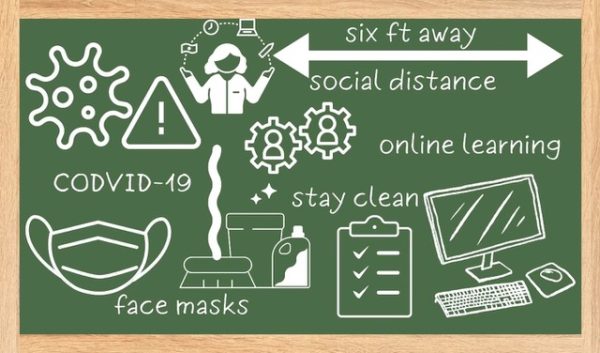Extracurriculars: becoming more fun or stressful?

Bridgette Chenevert, Susie Walters and Izzy Englund rehearse their audition pieces.
For high school students today, feeling stressed and under pressure is a real problem affecting the mental health of many students. Living up to the expectations set by schools, parents, and colleges can be difficult, leading students to overwork themselves by getting involved in many clubs, AP classes, and sports. Over the past few years, participating in sports and clubs has become less about the purpose of enjoyment and community, and more about trying to fit the “ideal student” image that students believe they need to be.
“I definitely think that there’s a lot of pressure on every student here,” Ashley Chon, sophomore, said. “There’s a lot of stress because we have so many expectations put upon us to get us where we want to be.”
Many students are told that things like AP classes, sports, and clubs are ways to beef up their college applications, leading many students to feel like they need to be as involved as they can be.
“I am involved in the JV girls soccer team, I do ICEF, I’m part of Model UN, the East Asian Club, and I participate in snowboarding in the winter and track in the spring,” Chon, said. “And I’m also in jazz band, as well as taking APUSH this year.”
Students who are heavily involved at the school, like Chon, do appear to fit the “ideal student” image that students believe they need to be. But how do all the added activities affect students’ mental health?
“On a scale from one to ten, my stress level is like a six or seven, if ten was the highest level,” Chon said. “At the beginning of the year though, I was definitely up at a solid nine or even ten.”
Students overwhelming themselves with school is not uncommon. A recent study showed that 49 percent of high school students in the U.S feel a “good deal of stress” on a daily basis. However, while one the top causes of stress in high school students is deadlines and tests, too many extracurriculars can have a negative, stress-inducing impact on students.
For high school students today, feeling stressed and under pressure is a real problem affecting the mental health of many students. Living up to the expectations set by schools, parents, and colleges can be difficult, leading students to overwork themselves by getting involved in many clubs, AP classes, and sports. Over the past few years, participating in sports and clubs has become less about the purpose of enjoyment and community, and more about trying to fit the “ideal student” image that students believe they need to be.
“I definitely think that there’s a lot of pressure on every student here,” Ashley Chon, sophomore, said. “There’s a lot of stress because we have so many expectations put upon us to get us where we want to be.”
Many students are told that things like AP classes, sports, and clubs are ways to beef up their college applications, leading many students to feel like they need to be as involved as they can be.
“I am involved in the JV girls soccer team, I do ICEF, I’m part of Model UN, the East Asian Club, and I participate in snowboarding in the winter and track in the spring,” Chon, said. “And I’m also in jazz band, as well as taking APUSH this year.”
Students who are heavily involved at the school, like Chon, do appear to fit the “ideal student” image that students believe they need to be. But how do all the added activities affect students’ mental health?
“On a scale from one to ten, my stress level is like a six or seven, if ten was the highest level,” Chon said. “At the beginning of the year though, I was definitely up at a solid nine or even ten.”
Students overwhelming themselves with school is not uncommon. A recent study showed that 49 percent of high school students in the U.S feel a “good deal of stress” on a daily basis. However, while one the top causes of stress in high school students is deadlines and tests, too many extracurriculars can have a negative, stress-inducing impact on students.
“Most of my stress comes from having to get my assignments in on time, and usually my extracurriculars aren’t too stress-inducing,” Chon said. “But when there’s a week when a lot of tests or deadlines are coming up, that’s where I get stuck trying to do it all.”
Extracurriculars are there as a way for students to expand in their horizons and form community with their peers; they aren’t there to add more stress to a student’s life. The expectation that colleges look for well-rounded students who are involved in activities outside of the academic sphere has been blown up to make it seem like students need to do it all. In the frenzy to participate in as many extracurriculars as possible, students tend to lose sight of the main goal of their extra activities: to build community.
“I really do all the things that I do because I like to meet new people and have different experiences,” Chon said. “And I really just enjoy doing different things to broaden what I have done.”
For some students, doing as many extracurriculars as possible isn’t a priority. Students like Mae Moriarty, who choose a few select things to focus on instead of trying to do it all.
“I am in honors orchestra, APUSH, and I have a job working as a personal assistant for about 15 hours a week,” Moriarty, sophomore said. “I’m not involved in any of the school sports, or any of the clubs at West Linn.”
By choosing to participate in less extracurriculars, students like Moriarty are able to enjoy what they are doing more and destress, which is the true purpose of extracurriculars. Overworking is not the main source of stress for high school students; however, there is a definite difference in amounts of stress between students who are involved in more or less extracurriculars.
“On a scale from one to ten on how stressed I am, I would say I’m like a solid three,” Moriarty said. “Unless it’s the night before something’s due. Then I’m definitely an eight.”
For all students, there is definitely always going to be a certain amount of stress coming from tests or deadlines, which can’t really be fixed right now. However, when students are thinking about taking up a few extracurriculars, it’s important to remember that quality over quantity applies here; extracurriculars are ways to build community and enjoy non-academic aspects of the high school experience. Prioritizing that over doing as many activities as possible is a sure way to manage stress and maintain a good mental health.
After taking into account the fact these “extras” are not, and shouldn’t be, the main source of stress in students’ lives, the question is asked: Is the extra stress from extracurriculars and AP classes really worth it in the end? For Chon, she believed that worth it or not, good mental health should be the bottom line.
“Mental health should be the first priority,” Chon said. “I honestly don’t think there’s much we can do to improve the amounts of stress in students, but we can put mental health first.”
Your donation will support the student journalists of West Linn High School. Your contribution will allow us to continue to produce quality content by purchasing equipment, software, and continuing to host our website on School Newspapers Online (SNO).

Delaney Callaghan, senior, is the People section editor for wlhsNOW. A member of the staff since her sophomore year, she loves writing about the unique...


























![Game, set, and match. Corbin Atchley, sophomore, high fives Sanam Sidhu, freshman, after a rally with other club members. “I just joined [the club],” Sidhu said. “[I heard about it] on Instagram, they always post about it, I’ve been wanting to come. My parents used to play [net sports] too and they taught us, and then I learned from my brother.”](https://wlhsnow.com/wp-content/uploads/2024/03/MG_7715-2-1200x800.jpg)





![The teams prepare to start another play with just a few minutes left in the first half. The Lions were in the lead at halftime with a score of 27-0. At half time, the team went back to the locker rooms. “[We ate] orange slices,” Malos said. “[Then] our team came out and got the win.”](https://wlhsnow.com/wp-content/uploads/2023/10/IMG_2385-1200x800.jpg)





![At the bottom of the third inning, the Lions are still scoreless. Rowe stands at home plate, preparing to bat, while Vandenbrink stands off to the side as the next batter up. Despite having the bases loaded, the team was unable to score any runs. “It’s just the beginning of the season. We’re just going to be playing out best by June, [and] that’s where champions are,” Rowe said.](https://wlhsnow.com/wp-content/uploads/2024/03/IMG_3077-1200x900.jpg)
















































































